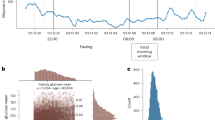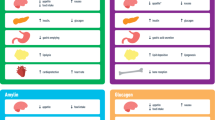Abstract
Lifestyle modifications, including body weight reduction and salt restriction, help reduce blood pressure (BP). This study investigated the effects of body mass index (BMI) and salt intake on home BP reductions in unmedicated patients with hypertension receiving guideline-based lifestyle modification from doctors (control group) or with the addition of a digital therapeutics intervention. Data from the HERB Digital Hypertension 1 (HERB-DH1) pivotal trial were analyzed. Home BP was measured for 7 days before each study visit (baseline, and 4/8/12 weeks). Body weight was measured at each visit and salt intake questionnaire was answered at baseline and 12 weeks. This analysis included 302 patients with sufficient home BP monitoring data (digital therapeutics: 156; control group: 146). The reduction in morning home SBP from baseline to 12 weeks was significantly greater in the digital therapeutics vs. control group for patients with baseline BMI ≥ 25 kg/m2 and higher salt intake group (self-reported salt intake score ≥ 14) (–5.1 mmHg, p < 0.01). Patients in the digital therapeutics group who experienced a reduction in BMI and an improvement in salt intake score during the 12-week study also had a significantly greater reduction in morning home SBP compared with patients in the control group (–7.2 mmHg, p < 0.01). The digital therapeutic intervention reduced home BP the most in unmedicated patients with hypertension with high baseline BMI and salt intake score. Those with improvements in both BMI and salt intake during the digital therapeutics intervention achieved the greatest reduction in home BP vs. control.
Clinical trial registration: Japan Registry of Clinical Trials (jRCT2032190148)

This is a preview of subscription content, access via your institution
Access options
Subscribe to this journal
Receive 12 print issues and online access
$259.00 per year
only $21.58 per issue
Buy this article
- Purchase on Springer Link
- Instant access to full article PDF
Prices may be subject to local taxes which are calculated during checkout


Similar content being viewed by others
References
Roth GA, Mensah GA, Johnson CO, Addolorato G, Ammirati E, Baddour LM, et al. Global Burden of Cardiovascular Diseases and Risk Factors, 1990-2019: Update From the GBD 2019 Study. J Am Coll Cardiol. 2020;76:2982–3021.
Wilson PW, D’Agostino RB, Sullivan L, Parise H, Kannel WB. Overweight and obesity as determinants of cardiovascular risk: the Framingham experience. Arch Intern Med. 2002;162:1867–72.
Global Burden of Metabolic Risk Factors for Chronic Diseases Collaboration, Lu Y, Hajifathalian K, Ezzati M, Woodward M, Rimm EB, et al. Metabolic mediators of the effects of body-mass index, overweight, and obesity on coronary heart disease and stroke: a pooled analysis of 97 prospective cohorts with 1.8 million participants. Lancet. 2014;383:970–83.
Intersalt: an international study of electrolyte excretion and blood pressure. Results for 24 h urinary sodium and potassium excretion. Intersalt Cooperative Research Group. BMJ 1988;297:319–28.
Aburto NJ, Ziolkovska A, Hooper L, Elliott P, Cappuccio FP, Meerpohl JJ. Effect of lower sodium intake on health: systematic review and meta-analyses. BMJ 2013;346:f1326.
Wójcik M, Kozioł-Kozakowska A. Obesity, Sodium Homeostasis, and Arterial Hypertension in Children and Adolescents. Nutrients. 2021;13:4032.
Elijovich F, Weinberger MH, Anderson CA, Appel LJ, Bursztyn M, Cook NR, et al. Salt Sensitivity of Blood Pressure: A Scientific Statement From the American Heart Association. Hypertension 2016;68:e7–e46.
Uzu T, Kimura G, Yamauchi A, Kanasaki M, Isshiki K, Araki S, et al. Enhanced sodium sensitivity and disturbed circadian rhythm of blood pressure in essential hypertension. J Hypertens. 2006;24:1627–32.
Zhou L, Stamler J, Chan Q, Van Horn L, Daviglus ML, Dyer AR, et al. Salt intake and prevalence of overweight/obesity in Japan, China, the United Kingdom, and the United States: the INTERMAP Study. Am J Clin Nutr. 2019;110:34–40.
Umemura S, Arima H, Arima S, Asayama K, Dohi Y, Hirooka Y, et al. The Japanese Society of Hypertension Guidelines for the Management of Hypertension (JSH 2019). Hypertens Res. 2019;42:1235–481.
Kario K, Nomura A, Harada N, Tanigawa T, So R, Nakagawa K, et al. A multicenter clinical trial to assess the efficacy of the digital therapeutics for essential hypertension: Rationale and design of the HERB-DH1 trial. J Clin Hypertens (Greenwich). 2020;22:1713–22.
Kario K, Nomura A, Harada N, Okura A, Nakagawa K, Tanigawa T, et al. Efficacy of a digital therapeutics system in the management of essential hypertension: the HERB-DH1 pivotal trial. Eur Heart J. 2021;42:4111–22.
Yasutake K, Miyoshi E, Kajiyama T, Umeki Y, Misumi Y, Horita N, et al. Comparison of a salt check sheet with 24-h urinary salt excretion measurement in local residents. Hypertens Res. 2016;39:879–85.
Wang M, Moran AE, Liu J, Qi Y, Xie W, Tzong K, et al. A Meta-Analysis of Effect of Dietary Salt Restriction on Blood Pressure in Chinese Adults. Glob. Heart 2015;10:291–9 e6.
Suckling RJ, He FJ, Markandu ND, MacGregor GA. Dietary salt influences postprandial plasma sodium concentration and systolic blood pressure. Kidney Int. 2012;81:407–11.
Whelton PK, Appel LJ, Espeland MA, Applegate WB, Ettinger WH Jr., Kostis JB, et al. Sodium reduction and weight loss in the treatment of hypertension in older persons: a randomized controlled trial of nonpharmacologic interventions in the elderly (TONE). TONE Collaborative Research Group. JAMA 1998;279:839–46.
Kario K. Essential Manual on Perfect 24-hour Blood Pressure Management from Morning to Nocturnal Hypertension. London: Wiley; 2022.
Powles J, Fahimi S, Micha R, Khatibzadeh S, Shi P, Ezzati M, et al. Global, regional and national sodium intakes in 1990 and 2010: a systematic analysis of 24 h urinary sodium excretion and dietary surveys worldwide. BMJ Open. 2013;3:e003733.
Katsuya T, Ishikawa K, Sugimoto K, Rakugi H, Ogihara T. Salt sensitivity of Japanese from the viewpoint of gene polymorphism. Hypertens Res. 2003;26:521–5.
Kario K, Chia YC, Siddique S, Turana Y, Li Y, Chen CH, et al. Seven-action approaches for the management of hypertension in Asia - The HOPE Asia network. J Clin Hypertens (Greenwich). 2022;24:213–23.
Dugas M, Crowley K, Gao GG, Xu T, Agarwal R, Kruglanski AW, et al. Individual differences in regulatory mode moderate the effectiveness of a pilot mHealth trial for diabetes management among older veterans. PLoS ONE. 2018;13:e0192807.
Kario K, Harada N, Okura A. Digital Therapeutics in Hypertension: Evidence and Perspectives. Hypertension 2022;79:2148–58.
Acknowledgements
English language editing assistance was provided by Nicola Ryan, independent medical writer, funded by Jichi Medical University.
Funding
The HERB DH1 study was funded by CureApp Inc. This work was supported by Japan Agency for Medical Research and Development (AMED) under Grant Number 22rea522105h0001.
Author information
Authors and Affiliations
Contributions
Study conception and design: KK, NT, NH, AO, FH, and TT. Data preparation: NH and FH. Data analysis and interpretation: KK, NT, and SH. Drafting and revising of the paper: KK, NT, and SH. Final approval of the submitted paper: KK.
Corresponding author
Ethics declarations
Conflict of interest
KK has received research grants from Cure App, A&D Co. and from Omron Healthcare. KK has received consulting fees from CureApp Inc. TT and FH are employees of CureApp Inc. All other authors have no competing interests to disclose.
Additional information
Publisher’s note Springer Nature remains neutral with regard to jurisdictional claims in published maps and institutional affiliations.
Supplementary Information
Rights and permissions
Springer Nature or its licensor (e.g. a society or other partner) holds exclusive rights to this article under a publishing agreement with the author(s) or other rightsholder(s); author self-archiving of the accepted manuscript version of this article is solely governed by the terms of such publishing agreement and applicable law.
About this article
Cite this article
Kario, K., Tomitani, N., Harada, N. et al. Home blood pressure-lowering effect of digital therapeutics in hypertension: impact of body weight and salt intake. Hypertens Res 46, 1181–1187 (2023). https://doi.org/10.1038/s41440-023-01245-7
Received:
Revised:
Accepted:
Published:
Issue Date:
DOI: https://doi.org/10.1038/s41440-023-01245-7
Keywords
This article is cited by
-
2023 update and perspectives
Hypertension Research (2024)
-
Daily self-reported behavioural efficacy records on hypertension digital therapeutics as digital metrics associated with the reduction in morning home blood pressure: post-hoc analysis of HERB-DH1 trial
Hypertension Research (2024)
-
The effects of smartphone apps expected in self-management for hypertension management
Hypertension Research (2024)
-
Determinants and clinical implication of hypertension from childhood to old age in Asian subjects
Hypertension Research (2023)
-
The future of digital hypertension management to overcome clinical inertia
Hypertension Research (2023)



